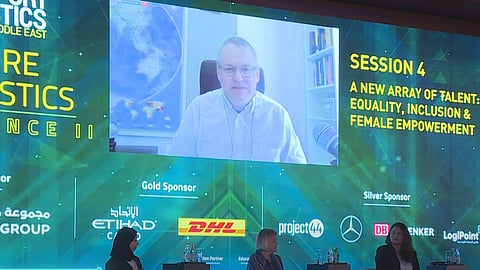Gender Parity in the Logistics Workforce Growing Steadily in UAE
The fourth and last session of the Future of Logistics Conference Part II held recently in Dubai focussed on Equality, Inclusion and Women’s Empowerment in the logistics sector.
Moderating the session, CEO & Partner of Vespucci Maritime and industry thought leader, Lars Jensen asked the panellists if the industry has attracted the kind of people that it needs today and if it has, then is it doing the right things to retain this much-needed talent?
The Middle East region is Definitely Ahead on Diversity in the Workforce – Eva Mattheeussen
With over 37% female workers in DHL Global Forwarding’s Middle East operations, Eva Mattheeussen, Head of HR, MEA and Global Project Lead at DHL Global Forwarding said the region was far ahead of others when it came to gender diversity in the workplace.
According to Ms Mattheeussen, creating gender diversity in the workforce is a question of building a pipeline of human resources and discovering ways to make the logistics industry attractive to females and to the younger generation.
DHL Global Forwarding has recently started a project to become future ready in which employees can talk about their success stories which are then widely circulated to inform people on what it is like to work at DHL Global Forwarding.
Ms Mattheeussen concluded by saying that with more innovation and digitalisation in the logistics industry it is becoming more attractive to a diverse and younger workforce.
To be Effective, Remote Working Requires Building of Trust – Eva Mattheeussen
As a new mom, Eva Mattheeussen, Head of HR, MEA and Global Project Lead, DHL Global Forwarding, said that remote working was a blessing for her and “has given access to more talents”. However, Ms Matheeussen added that at the same time remote working could be disadvantageous in terms of visibility, networking and promotions.
The UAE aside, in many countries across the MEA region the traditional “go to office” culture is very much prevalent, and many people thought that to be optimally productive one had to work from office. This has given rise to a “trust factor” which was, however, evolving with time.
According to Ms Mattheeussen, another factor was the infrastructure of working from home. If you had an unreliable network connection or too many kids in a small apartment, then working from home could be a problem.
The building of trust and cultural acceptance were key in creating a successful remote working environment for the organisation, concluded Ms Mattheeussen.
What Should be the Role of Governments in Increasing Gender Diversity in Logistics? Asks Lars Jensen
In his closing comments as moderator of the Equality, Inclusion and Female Empowerment Session of the Future of Logistics Conference Part II held recently in Dubai, CEO & Partner of Vespuccci Maritime and shipping industry thoughtleader Lars Jensen said that while gender diversity in the transport and logistics sectors was growing in some countries it had yet to make itself visible in the top management of most companies across the globe.
Mr Jensen also asked if the industry should leave the issue of gender diversity in the workplace to “market forces” or should governments step up to incentivise and promote the inclusion of women professionals in logistics operations?
Watch More: Collaboration and Competition Can Create Sustainable Supply Chains


